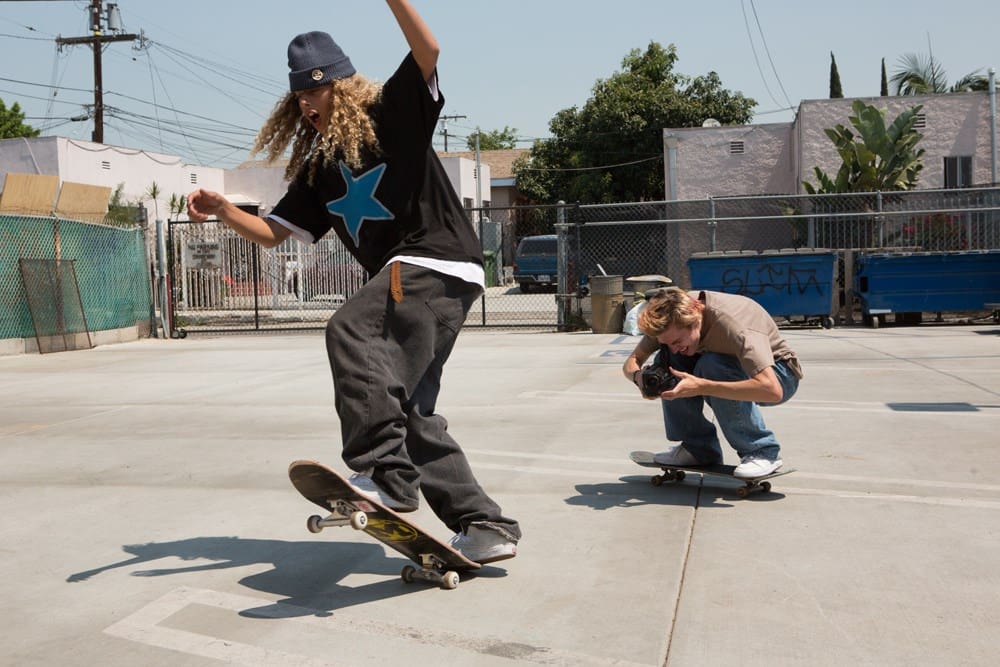
Jonah Hill’s career has been one of surprises. He’s evolved from the quirky star of a teen sex comedy to a two-time Oscar nominee who consistently makes picks interesting projects and working with a crop of supremely talented filmmakers in the process. Now, he can confidently add “director” to his resume as, if anything, his filmmaking debut, proves he has some talent behind the camera.
But Mid90s is a peculiar film — one that feels half-baked not in its execution, but in its ideas. As Hill attempts to capture the coming-of-age experience for young men, his film veers into potentially toxic territory that he doesn’t seem to know how to explore.
It follows thirteen year-old Stevie (an excellent Sunny Suljic), an aimless kid who desperately wants to fit in somewhere. His young, single mother (Katharine Waterston) is doting but treats him like a kid while his older brother (Lucas Hedges) becomes violent whenever Stevie tries to get close. Things start to brighten up, however, when he meets a group of skaters who slowly take him in as one of their own. Suddenly, Stevie is spending his afternoons trying to learn how to skate, and his nights experimenting with drugs, sex, and other reckless behavior. Along the way, he learns valuable life lessons about his privilege… but, unfortunately, Hill can’t muster much to say, and the film suffers as a result.
It must be said: Hill’s depiction of male coming-of-age has a decidedly narrow view point, in that it will likely only resonate in full with straight white men. The film’s characters toss around epithets and slurs in moments that are played for laughs and are defended by the film’s supporters as “realistic.” That may be true — many teens say offensive things while growing up. But to depict this as a universal part of growing up, with zero consequences, feels irresponsible and incredibly dismissive of the growing-up experiences of queer teens or teens of color. The movie also has an incredibly uncomfortable sequence depicting Stevie’s first sexual encounter which, in addition to being needlessly explicit, depicts his female partner as a one-dimensional guide to what sex is like — her only character traits are her sexual desire and experience. It’s not realistic to what high school sex is actually like, and portrays women in a problematic light.
But, even if you ignore the incredibly narrow frame of reference for the film’s narrative, it still runs into bizarre walls and confounding developments that throw the whole thing off. Stevie, for example, has a self-harm issue that is incredibly disturbing, but never explored at all. Is it indicative of some greater mental issue or just an (irresponsibly handled) character quirk? Similarly, Stevie’s brother is a genuinely abusive older sibling who seems deeply disturbed, but the film doesn’t seem interested in exploring that at all. Some scenes suggest he has some sort of un-diagnosed mental health issue. Another suggests he’s repressing his sexual orientation. It’s never explored in the slightest, however.
By the time the film reaches its final act, it should come as no surprise that it is uninterested in actually saying something about its characters. One of the final moments finds a character making a terrible decision that could have had seriously life-altering ramifications for his friends, only to be forgiven without even a slap on the wrist or the tiniest hint that he needs to fix himself. This summarizes the main problem of Mid90s: it mistakes childhood antics with genuinely toxic behavior, and it excuses its characters of any responsibility. In 2018, this messaging feels especially tone deaf. But, in any year, it would still be frustrating.
Despite all this, there is actually a lot to celebrate with Mid90s. While Hill needs to work on exploring deeper themes, he knows how to stylishly explore his sets and wordlessly create a believable universe. While ’90s kids certainly love their nostalgia, the film deserves credit for not going overboard on callbacks to that decade. The references feel organic and earned. Hill also crafts some truly kinetic skating scenes, and the most visually stunning party sequence in recent memory.
He has also assembled a stellar cast who supply the subtext and nuance the script lacks. Suljic is a complete joy, and knows how to make his character charming and naive without becoming precocious. All of the child stars, in fact, bring a lot of substance to their roles. They feel like teens who would have just walked onto the set and, even when the film goes down relatively clichéd roads, they find a way to make it all work. Meanwhile, at home, Waterston makes the most of her tragically limited screen time.
It’s impossible to get a handle on how her character is supposed to be viewed, but she at least strives to make her feel like a real person. Hedges, however, runs away with the whole damn movie, and somehow makes his horribly-written character work. While he may not be one of the “Internet’s boyfriends” just yet, he has a particular talent that other actors in his age range don’t: he knows how to remind the audience that he’s just a young kid at the drop of a hat. In one brilliant scene, he seems so scary and obnoxious, only to suddenly start crying to heart-breaking effect. He’s a wonderful, versatile actor who will hopefully deliver more strong work with better scripts.
There is a great movie buried here somewhere, it’s just hidden under some bizarre narrative choices and an underwritten script. Over the past ten or so years that he’s been gracing the big screen, Hill has become an incredibly talented star; someone who always shows up and does something interesting—even when the script doesn’t exactly call for anything special. If only he could have done the same behind the camera. Luckily, there are glimmers of hope here: maybe his sophomore feature will be a home run.
Rating: 5/10


Comments are closed.